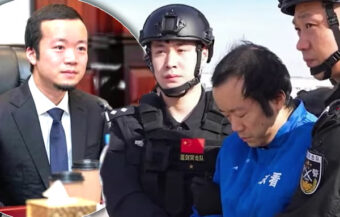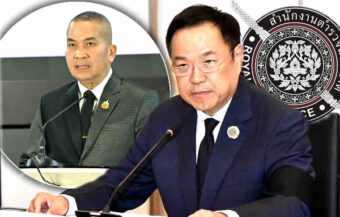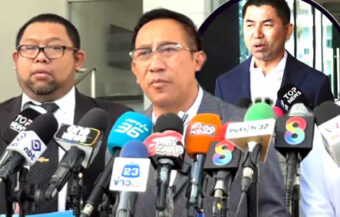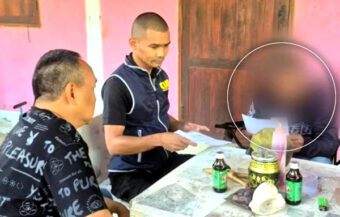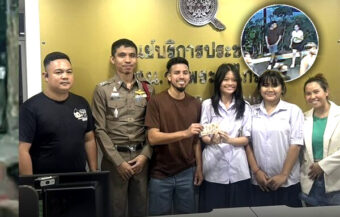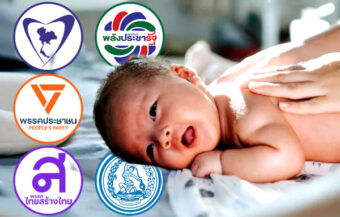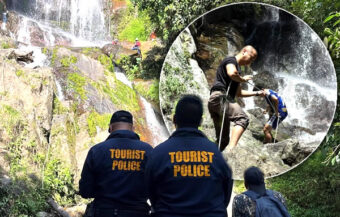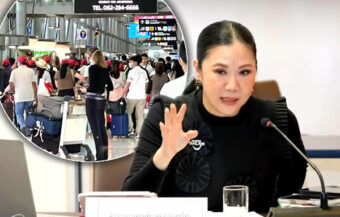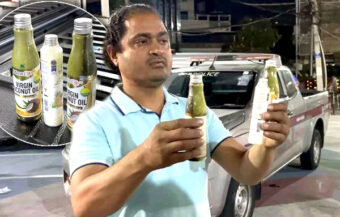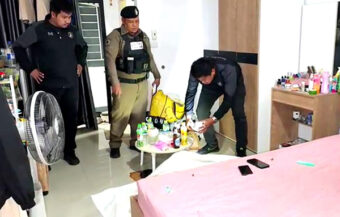Thailand could be on the brink of a fourth and even more deadly wave of the virus as a top Thai doctor warns that daily infection rates could go beyond 10,000 as the capital reels from an unexpected surge in Covid-19 infections which has left the country’s public health service dangerously exposed.
The Deputy Prime Minister and Minister of Public Health, Anutin Charnvirakul, moved on Thursday night to assure the public that Thailand’s public health system will not collapse even as senior medical officials within the system were warning of just that following an alarming surge in infections within Bangkok which appears to have caught the country’s public health planners off guard. It now looks like Thailand is at the beginning of a fourth wave of infection, again emanating from Bangkok, which may be linked to the emerging dominance of the Delta or Indian variant of the disease which medical experts say is 50 to 60% more infectious than the country’s previous dominant strain. It comes as the PM, on Thursday, held emergency conferences and ordered more soldiers, resources and even trainee doctors and medical personnel to Bangkok.
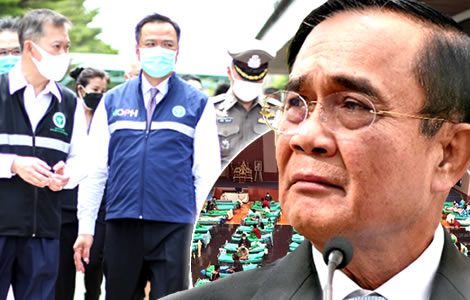
A senior Thai public health official has warned that a developing crisis, driven by a spiral of Covid 19 virus infections in Bangkok and surrounding provinces, is threatening to collapse the public health system.
Somsak Akksilp is the Director-general of the Department of Medical Service at the Ministry of Public Health.
Not enough hospital beds and ICU places to deal with the current public health crisis in Bangkok
He is warning there are not enough hospital beds and even more critically, a dearth of ICU facilities to cope with the daily increase in demand owing to the strong and rising tally of Covid-19 infections.
His fears and assessment were confirmed by Dr Yuwares Sittichanbuncha, the Head of Emergency at Ramathibodi Hospital in Bangkok, who said this: ‘ICU beds are fully occupied. We have to begin to choose who will go on them, and who shouldn’t. Don’t let your guard down. Precautions are always important.’
PM orders all spare resources nationwide including more soldiers and trainee personnel to Bangkok to shore up the fight against the resurgent virus
The situation led to crisis talks and conferences on Thursday involving Prime Minister Prayut Chan ocha and senior officials including the governors of provinces involved.
On Thursday, after consulting with senior staff and officials in all provinces affected, the Prime Minister, General Prayut, issued a call to all state agencies to redeploy spare resources to Bangkok including medical staff and soldiers.
His order also includes trainee doctors and medical support personnel.
Urgent nature of the talks and conferences driven by the Prime Minister’s deep concern about the situation
Government and Centre for Covid-19 Situation Administration (CCSA) spokesperson Apisamai Srisangson acknowledged the urgent nature of the discussions as she told the press that the PM was disturbed by the shortage of hospital beds in the capital.
This situation first came to light on Wednesday when the CCSA’s Dr Taweesilp Visanuyothin briefed the press and let it be known that a shutdown of Bangkok for one week had been discussed by senior officials but that no decision had been made.
The purpose of such a move was to try and quell the surging growth in infections that has taken the government by surprise.
Officials reluctant to impose a lockdown in Bangkok, at this point, for fear of an exodus that may help spread the new wave to the provinces
Dr Taweesilp of the CCSA, on Wednesday, said that authorities were still reluctant, at this point, to impose a lockdown on the capital not just because of the economic damage but because of the strong counterargument that such a move would only serve to distribute the new wave further outside Bangkok as people would return home to the provinces.
‘The lockdown measure has its pros and cons and must be weighed,’ Dr Taweesilp said. ‘Closure of an area or factory may bring infections under control, but workers will be left jobless and head back to their home provinces and problems will arise in other areas. Putting Bangkok in lockdown will prompt movement to the provinces and lead to more infections.’
‘Bubble and seal’ implemented but the nature of the metropolis and building sites make it less effective
He pointed out that officials have been trying to pursue more targeted measures to control infections within the capital and infected provinces with ‘bubble and seal’ orders which proved effective in Samut Sakhon province in late last year.
The problem in Bangkok is that many of the targets are construction sites and also the environment of the metropolis makes such orders harder to enforce especially dealing with large numbers of migrant workers.
Thursday’s emergency conferences dealt primarily with the shortage of hospital beds and medical resources to cope with the rising demand as infections spread.
One official pointed out that this virus wave is hitting the younger population including children and although it presents a very insignificant risk to this group, they must still be hospitalised and isolated thereby taking up bed numbers.
10% of people tested coming back positive
On Tuesday, Dr Nithiphat Chiarakun of the Faculty of Medicine, Siriraj Hospital came out publicly in support of a lockdown of the Thai capital.
He pointed to a dwindling supply of hospital beds and warned that over 10% of people tested are now showing up as positive for the disease.
However, he also called for measures on this occasion to halt the public travelling from the capital in an exodus which would carry the virus with it.
‘It seems we have been cornered without much choice. The last solution to the crisis is to lock down Bangkok for at least seven days to fix these existing problems and prevent new ones,’ he disclosed on a Facebook social media post. ‘This time, people in Bangkok must be prevented from returning to the provinces, a mistake which was made during Songkran.’
The emergency situation has forced officials to again consider instituting a protocol for some Covid-19 sufferers to be left to recover in isolation at home although the last time this was considered, it was opposed strongly by medical experts.
Shortage of hospital beds had led to moves to create more hospitels and army field hospitals
This has left officials scouring the network of hundreds of private hospitals in Bangkok which have very few beds available leaving them with the other option of deploying army field hospitals.
Dr Jadet Thammathat-Aree of the National Health Security Office told the press that throwing extra money or budgets at the problem was scarcely effective.
‘On the issue of budget allocations for medical treatment, we have provided sufficient funds but the number of patients is not dropping,’ Dr Jadet outlined. ‘There are 2,000 to 3,000 more infected people each day, particularly in Bangkok and nearby. This is placing more pressure on the availability of hospital beds.’
He appeared to be putting his faith more in the creation of short term army hospitals and beds and said he expected 1,000 more beds at least to be set up but that the demand was still far greater.
‘Field hospitals and hospitels have been set up, but there are clusters of infections that increase the need for beds.’
Hospitels are converted hotels that are being used as short term hospitals.
Not confirmed if the surge in infection is due to the Delta variant but top Thai doctor and virologist Dr Yong Poovorawan has been preparing
It is not known what the reason for the sudden uptick in infection rates is but, in recent days, top virologists have predicted that the Delta strain of Covid 19 from India will, by the end of this year, become the dominant force of the virus in Thailand taking over from the Alpha strain or UK variant that drove the third wave of infections.
The Delta strain is currently being studied by top Thai virologists including the highly respected Dr Yong Poovorawan of the Centre of Excellence in Clinical Virology at Chulalongkorn University who is examining the effectiveness of combining Thailand’s existing available vaccines in an effort to strengthen the overall effect of vaccines against this new threat that has already arrived.
This variant is currently the greatest threat also facing countries with advanced immunisation programmes such as the United States and the United Kingdom as it has now spread to 92 nations.
It has been breeding within Thailand’s large number of construction encampments which are concentrated in or around Bangkok.
Up to 50 to 60% more infectious than the previous dominant strain the UK or Alpha variant which has driven the third wave since early April
The Delta variant of Covid-19 is thought to be 50 to 60% more infectious than the UK variant of the disease which, in itself, was 50 to 60% more infectious than the initial variant which emerged from Wuhan in early last year.
The Alpha variant drove the most recent third virus wave in Thailand which emerged in early April causing unprecedented levels of infection and loss of life.
Dr Nithiphat of the Faculty of Medicine, Siriraj Hospital warns that at the current rate of growth, the latest wave emerging from Bangkok could well begin to exceed four digits or leave the country’s infection rate in excess of 10,000 per day.
US-based, Dr Bhramar Mukherjee, is the Associate Professor of Quantitative Data Science at the University of Michigan Rogel Cancer Center.
‘Most studies indicate Delta is 50 to 60% more transmissible than the Alpha variant,’ he said this week. ‘The Alpha variant itself was nearly 50to 60% more transmissible than the original strain.’
Join the Thai News forum, follow Thai Examiner on Facebook here
Receive all our stories as they come out on Telegram here
Follow Thai Examiner here
Further reading:
Taiwan accuses Thailand of prioritising its own access to the AstraZeneca vaccine amid delays
Door open to expats for vaccine appointments, they simply have to push says top official
Thai Princess steps into the vaccination drive as there is positive news from officials in Phuket
Thai King speaks candidly and insightfully on the danger posed by depression to his young audience
Government making it easier for expats to access vaccine rollout including private sector option
Thai government urged to buy more vaccine doses at any cost as the only way out of a growing crisis
Thailand may face a ‘real crisis’ as 3rd virus wave fails to slow amid record deaths says top doctor
PM Prayut hands power back to the CCSA to find 100 million vaccine doses to defeat Covid-19
Thailand scrambles to procure more vaccines as infections and deaths from Covid-19 jump sharply
Executive with Thai Air Asia shareholder firm warns that the virus downturn has wreaked havoc
Officials turn to hotels for more scarce hospital beds but say the 3rd wave can be defeated in May
Still time to avoid lockdown says Health Minister as 3rd virus wave dwarfs all infections to date
Fears that a 3rd wave of Covid-19 may have begun in Thailand with top doctors raising the alarm
Centre for Covid-19 announces ‘bubble and seal’ measures after October 1st with quarantine lifted
Top docs say vaccine jabs are safe after Thai PM’s jab is cancelled for the second time in two weeks
Vaccination campaign begins in early morning jab event but hopes for more foreign tourists set back
Economy to rebound as the year progresses driven by exports and a return of mass foreign tourism
Door closing on quick foreign tourism return as economic recovery is delayed to the end of 2022
Top Thai official says vaccine passports are legally a matter for the WHO under international law
Strength of support for the monarchy being seen this week as political unrest deepens into standoff







